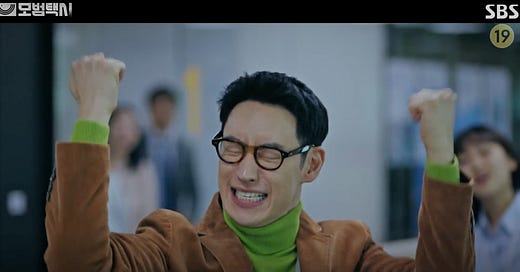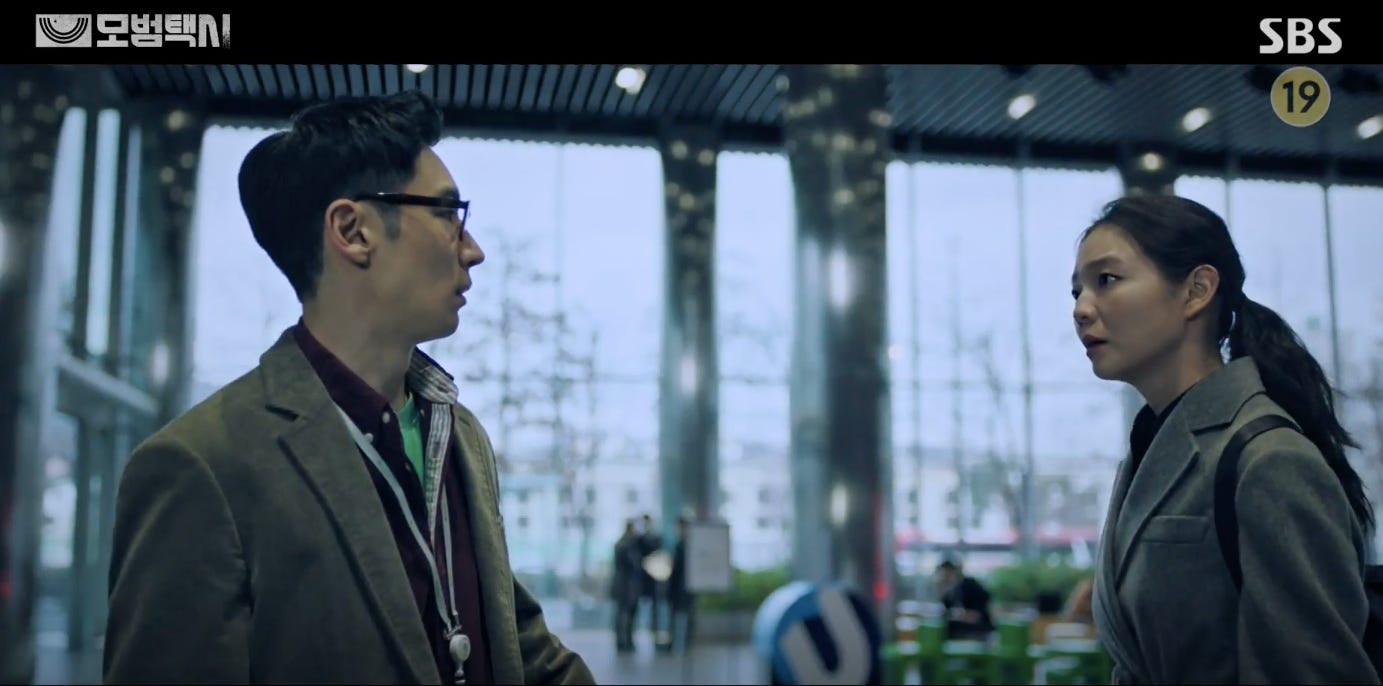Taxi Driver (2021) Rule of Lawlessness
The drama upped the ante in recent episodes by unleashing an all out assault on the rule of law, one of the bedrock principles of free, civilized societies. This is the idea that the laws of the land apply equally to all people living within its borders regardless of status. From the highest to the lowest, all are subject to the demands of the law. This is the promise that law enforcement agencies and the judiciary are expected to keep. When they don’t, confidence in the official processes eventually breakdown. Discontent arises and if the betrayal persists over time, it shouldn’t be surprising if some resourceful, frustrated individuals begin to take matters into their own hands. That seems to be the rationale behind the Rainbow Taxi project.
Assuming that the rule of law is a lofty and laudable aspiration, then something is seriously rotten in this universe if victims of crime feel let down by the very laws that are supposed to protect their rights. If the laws themselves aren’t the problem, then what is?
The most recent case features a tech giant, Udata headed by a motley of executives that look (and behave) more like comic book characters (Joker, Two-Face) than serious managers. Overseeing the entire enterprise is the mercurial Park Yang-jin who turns out to be nothing more than a glorified gangster. The man might be praised for running a tight ship but he wields inordinate power over his employees who alternate between adoration and fear for their overlord. The result is a toxic workplace driven by a culture of fear where all kinds of abuses are normalized. For instance, when victim-of-the-week, Seo Young-sin is violently humiliated in front of his peers for acting according to best practices in customer service, his colleagues turn a blind eye to their employer’s actions.
Of course Park Yang-jin is no bullying fool. He can be generous when it suits. Dishing out the stick to keep the minions in line works in tandem with offering them carrots to get them working. On Do-Ki’s first day, he witnesses Park Yang-jin’s ability to work the cubicle crowd with plenty of hype to spare. It’s meant to be celebratory event but it comes across to Go-eun and myself that it’s more like a religious meeting. The fervour certainly bears some resemblance to a particular brand of heterodox Christianity. The depiction of Park Yang-jin as a cult leader is absolutely on the money. He abuses his workers and yet he has them in the palm of his hands mesmerizing them with promises of paradise… abundant wealth… if they commit to his programme unswervingly.
Money talks and loudly.
When Seo Young-sin turns whistleblower, he receives the full force of Park Yang-jin’s wrath. The entity which is meant to protect him and bring down the likes of Park Yang-jin is used against the victim by an experienced lawyer, ex-prosecutor. Within the prosecutor’s office there’s another kind of workplace culture which allows for Udata’s new lawyer to buck the system. It’s essentially cronyism and Udata’s deep pockets can readily buy the services of an ex-prosecutor who can put the right sort of pressure on his colleagues to appease his masters.
Have money will travel.
I’ve always been fascinated by the fact that Director Jang maintains an office for the Blue Bird foundation inside the prosecutor’s office. Not only does it give him easy access to important documents relating to victims of crimes but he gets firsthand information on how the so-called law enforcers work. To them and much of the world he plays the affable director of Blue Bird. But using the resources of the foundation and his own taxi business, he is a powerful vigilante, seeing himself as someone who can go where the law can’t.
Rainbow Taxi Service is made up of what I call “true believers”. These are individuals who have lost loved ones in crimes. That’s why they were recruited and why they are wholly devoted to the cause of “equalizing” things for the victims. They are the backup crew when the frontliners have failed to give an account to those who have suffered in the hands of those more powerful than they and those who think themselves to be above the law.
The irony of course is that the members of Rainbow Taxi would see themselves as law enforcers when the official enforcers are impotent. Do-ki certainly sees it as his duty to mete out “the right kind” of punishment to those who most of us would agree are Really Bad people. That’s why the show resonates despite the hackles one might feel when “revenge” is exacted on those who have thus far evaded the arms of justice.
A glimpse into Do-ki’s backstory from the opening flashback/dream sequence confirms that his drive (pun intended) to help the helpless comes from guilt over his inability to protect his mother from a remorseless psychopathic murderer. That scene where he interacts with his mother over future plans is tinged with irony: His decision about going into the military because of his love of acting and his hope that when he becomes a general he will be given a nice big black car.
The law, the show is quick to point out, is either inadequate, ineffectual in the face of corruption or subject to abuses. It has a point. The law seems to be only as good as the men and women who have dedicated themselves to its promotion. The law makers on the one side and the law enforcers on the other. Even the deputy chief prosecutor with his position seems hapless to do the good that he was tasked with. Not only can the technicality of the law be manipulated, so can the man-in-charge. It’s obvious that we’re meant to see that adherence to the rule of law as some kind search for the holy grail.
Of course one could easily argue that no one, no matter how well-intentioned, should be allowed to take matters into their own hands. After all that’s what the rule of law should prevent. Even if one side cheats, it shouldn’t matter. Only sanctioned public servants should be allowed to take actions against perpetrators.
However, what if the officially-sanctioned officers are corrupt, manipulated or hamstrung, what are the vulnerable to do? These are the sorts of questions that come to mind as I watch Kang Ha-na struggle to reinstate Seo Young-sin’s case after being reprimanded and shown the door. The stonewalling aside, she can’t even get past the entry point to investigate. Whereas Do-ki, in another one of his undercover gigs, successfully penetrates the inner sanctum with Go-eun’s help. He is showing himself to be a vigilante hero whose superpower is his ability is to deceive with subtle changes in his mannerisms.
Ha-na means well for the most part (but accosting Do-ki in front of Udata was silly) and my own sense is that Director Jang is testing her with the intention of perhaps recruiting her or at the very least provide some kind of legal support. But for now she’s the outsider in a show dedicated to victims of crimes. That’s why he’s inviting her to group therapy, feeding her information about victims. It isn’t just to tug at her heartstrings. He likes her tenacity but it’s much harder for her to be committed to their goals. However he’s certainly hoping that her experiences with victims of crimes will take her closer to the conclusions that she needs to become a believer.
Good intentions only go so far. Actions of some sort have to be taken. But does Kim Do-ki go too far when he rear-ends Manager Lee’s vehicle and sends it off the road? That’s a hard one because Manager Lee was definitely preparing to finish off Seo Young-sin in his hospital bed.
The Godmother Baek Sung-mi is one of those Really Bad People in this expanding canvas of criminal exploits. The woman has her fingers in all kinds of unsavoury pies including organ sales in the black market. So it does beg the question as to why Director Jang would work with someone that represents everything that goes against his mission? What does that say about him? Is he someone who will break his own rules for expediency? He must have some inkling of her multiple interests and he shows no pretence to being friendly towards her. My feeling is that he has another agenda. There’s no denying his ambition in his reformist vision.
There’s also no denying the show’s popularity. Ratings locally and globally attest to this. The subject matter though bleak has captured the imagination of many. It’s not hard to see why. I give the other half some credit for half an insight (although I would have come to it myself) — deep down everyone knows that the law is limited against evil. Men and women who are its gatekeepers are weak of heart. There will be always be injustice and deep inside we’re longing for messiahs, heroes, even antiheroes that will give us hope that justice will ultimately triumph over evil.
















